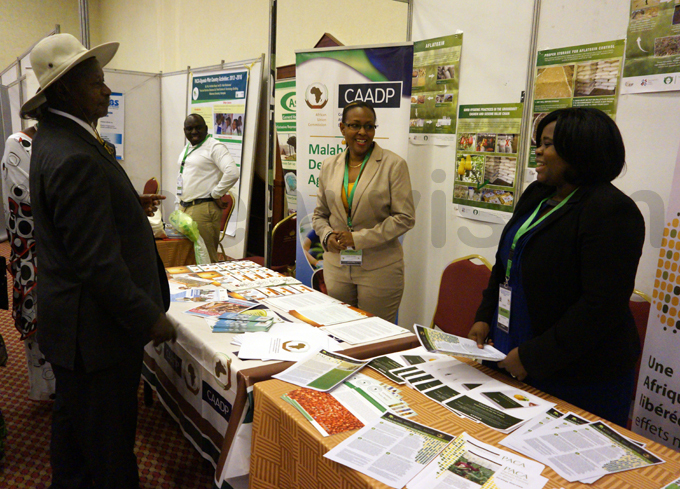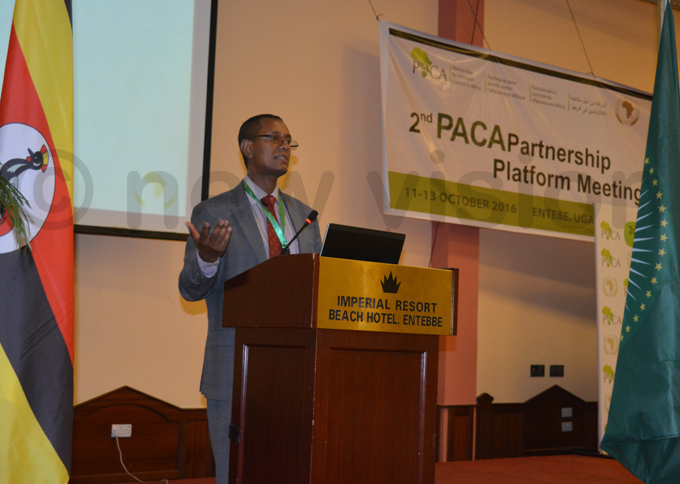AU to monitor aflatoxin control
Oct 13, 2016
The African Union Commission has drafted a scorecard that will help follow up on the progress made by different countries

Aflatoxins, which according to Prof Archileo Kaaya a senior nutritionist, are harmful substances produced by fungi in food, are at the centre of debate this week.
In a bid to save lives that would be lost to liver cancer and a host of many diseases as well as disorders caused by aflatoxins, the African Union Commission is planning to enact a continental scorecard.
This was revealed by Dr Amare Ayalew, the Program Manager of the AU's Partnership for Aflatoxin Control in Africa (PACA).
In his address to delegates at the second Partners Platform Meeting (PPM) organised in Entebbe by PACA, Amare said that the Commission has drafted the scorecard that will help follow-up on the progress made by the different countries.
"We have come up with a continent-wide score card and another for detailed country-level monitoring and evaluation," Amare says.
Lessons from Tanzania
This approach to monitoring and evaluation, comes after a recent aflatoxin outbreak in Tanzania that claimed lives of some citizens there.
According to Prof Martin Kimanya, the chairperson of the National Mycotoxin Steering Committee of Tanzania, the onset of the outbreak was a surprise for many due to lack of information.
"An outbreak of an unknown disease was reported on 13th June 2016. The patients had symptoms like abdominal pain, diarrhoea, vomiting, ascites and jaundice and these are similar to those associated with acute aflatoxin poisoning," Kimanya says.
 President Museveni touring the AU PACA stall. Photo by Solomon Kalema
President Museveni touring the AU PACA stall. Photo by Solomon Kalema
Prof Kimanya says that up to the 2nd of August, there were 56 cases and 18 deaths from the districts of Chemba, Kondoa, Dodoma MC, Chamwino districts and Kiteto (3) district in Manyara region.
How they dealt with it
As quick response, Kimanya says that a team consisting of experts from key sectors including health and development partners was formed to investigate the outbreak.
 Dr Amare Ayalew from the AU speaking at the meeting. Photo by Solomon Kalema
Dr Amare Ayalew from the AU speaking at the meeting. Photo by Solomon Kalema
"Having seen the symptoms, there was suspicion of aflatoxins. We worked together with the health ministry, the Tanzania Food and Drug Authority (TFDA) and World Health Organisation experts to tackle the outbreak," he says.
Together, the team designed a protocol to investigate the outbreak, taking food, urine and blood samples from the affected families and some unaffected families.
"We sent the blood samples to CDC America and the urine and food samples were sent to Gent University in Belgium. These were found to have high levels of aflatoxins and that is how we got to the cause of the problem," Prof Kimanya says.
The Tanzanian government, according to Kimanya responded by replacing the cereals, especially maize in the households of the affected families and those around them and has now embarked on a new communication strategy to increase awareness about the aflatoxins.
These new approaches, which are being adopted by other countries, are part of those that are to be monitored closely by PACA as noted by Dr Amare Ayalew.
The meeting which closed officially was highlighted by the attendance and submissions of President Yoweri Museveni, Rhoda Peace Tumusiime from the AU, Vincent Sempijja the Ugandan Agriculture Minister, Amelia Kyambadde the Ugandan Trade Minister, African Ministers, Members of Parliament as well as representatives of the East African Community and over 200 delegates attended.
